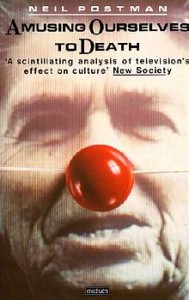[contextly_auto_sidebar id=”9SH7Jz0T3AVOjswZ9pMhaO2BBpIbBBbX”]
ONE of my all-time favorite social critics is the late, great author of Amusing Ourselves To Death: Public Discourse in the Age of Show Business. (I’m even fonder of his book Technopoly, which came out in the early ’90s but remains one of the great books about what the Internet would do to us.)
So my senses were stirred when I began to see writers on various sides of the spectrum — Matt Bai on politics, Jaron Lanier on technology and economics, Sherry Turkle and digital gadgets and our souls — drawing from his vision.
 The result is my new piece on Salon, here. I begin it this way:
The result is my new piece on Salon, here. I begin it this way:
These days, even the kind of educated person who might have once disdained TV and scorned electronic gadgets debates plot turns from “Game of Thrones” and carries an app-laden iPhone. The few left concerned about the effects of the Internet are dismissed as Luddites or killjoys who are on the wrong side of history. A new kind of consensus has shaped up as Steve Jobs becomes the new John Lennon, Amanda Palmer the new Liz Phair, and Elon Musk’s rebel cool graces magazines covers. Conservatives praise Silicon Valley for its entrepreneurial energy; a Democratic president steers millions of dollars of funding to Amazon.
It seems like a funny era for the work of a cautionary social critic, one often dubious about the wonders of technology – including television — whose most famous book came out three decades ago.
Like anyone who wrote in decades past, some of his work has dated. But much of it is more relevant than ever.

The chapter on the effect of telegraph on the human psyche alone makes this book worthwhile.
More wisdom from Mr. Moore
look at binary code. and the two tribal systems we call politics today. borg kiddies
I used “Amusing Ourselves” with my student for several years in high school. I ordered 60 paperback copies back about 25 years ago. Postman’s harmful trends back then seem almost benign compared to today’s internet immersion for young people. The way he traced the growth of literacy through several centuries and how it was rapidly being eroded was the perfect balance between academic and popular scholarship. “The Disappearance of Childhood” may be even a better book.
Postman’s works will profoundly shake up your views of today’s electronic mess. They’re also quick reads that will not take one away from “Game of Thrones” or “True Detective” for too long.
a generous, thoughtful essay on my mentor, friend and colleague. .